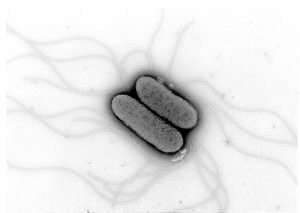How bugs avoid getting sick after sex

Scientists at the Institute of Food Research in Norwich revealed today how the promiscuous Salmonella bacterium protects itself from getting ill after acquiring foreign DNA through "sex" with other bacteria. This discovery could lead to the design of new antibiotics to fight this killer disease.
Salmonella causes food poisoning and kills around 1 million people worldwide every year; it is becoming more difficult to treat with drugs because it quickly evolves resistance to antibiotics by swapping genes with other bugs during "bacterial sex". These foreign genes help the bacterium because they make it infectious and resistant to antibiotics.
Professor Jay Hinton's group at the Institute of Food Research in collaboration with Oxford Gene Technology, have discovered that a protein called H-NS switches off these incoming genes until they need to be activated - a process called gene silencing. This BBSRC-funded study, published today in the respected online journal PLoS Pathogens shows that without proper control the incoming genes make proteins that are toxic for the bacterium. Without H-NS, the bacterium has problems growing and can't function properly. H-NS allows the bacteria to evolve by determining how new pieces of DNA are used in Salmonella.
"We may have found the Achilles' Heel for Salmonella bacteria because they need this H-NS protein to acquire new skills and become infectious" says Jay Hinton, "Salmonella still kills a huge number of people. Discoveries like this will help us find new ways of attacking these dangerous bacteria; if we can inactivate H-NS, we could discover urgently-needed new antibiotics."
Hinton's team found that H-NS works by coating stretches of the foreign DNA, which can be distinguished from Salmonella DNA because it contains a higher amount of the molecules adenine and thymine (A and T). H-NS binding stops foreign genes producing protein unnecessarily. Once the bacterium has invaded a human, the effect of H-NS is blocked and the genes can be switched on.
"Gene silencing is well known in plants and animals, but has never been seen before in bacteria" Jay Hinton adds, "It looks like H-NS has helped Salmonella to evolve to infect humans over the last 10 million years."
The researchers hope that this discovery could lead to a new strategy in the fight against drug-resistant "superbugs".
Source: Institute of Food Research

















